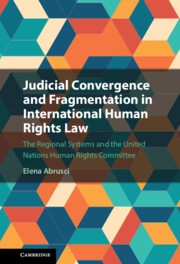 Judicial Convergence and Fragmentation in International Human Rights Law
Judicial Convergence and Fragmentation in International Human Rights Law The Role of NGOs and the Obstacles to Litigation
from Part II - Factors Explaining Judicial Convergence and Fragmentation
Published online by Cambridge University Press: 22 December 2022
This chapter moves away from the judicial behaviour of human rights systems and explores how other factors may influence convergence and fragmentation. First, it shows the reader how non-governmental organisations can be determinant in fostering convergence or triggering fragmentation through different activities. Thy include direct intervention in litigation, lobbying or through third party interventions, that is, amicus curiae. Second, it analyses all the instances where fragmentation does not arise simply because the case does not reach the merits stage. The increasing habit of regional court to encourage applicants to resort to friendly settlements could significantly limit the instances of fragmentation.
To save this book to your Kindle, first ensure [email protected] is added to your Approved Personal Document E-mail List under your Personal Document Settings on the Manage Your Content and Devices page of your Amazon account. Then enter the ‘name’ part of your Kindle email address below. Find out more about saving to your Kindle.
Note you can select to save to either the @free.kindle.com or @kindle.com variations. ‘@free.kindle.com’ emails are free but can only be saved to your device when it is connected to wi-fi. ‘@kindle.com’ emails can be delivered even when you are not connected to wi-fi, but note that service fees apply.
Find out more about the Kindle Personal Document Service.
To save content items to your account, please confirm that you agree to abide by our usage policies. If this is the first time you use this feature, you will be asked to authorise Cambridge Core to connect with your account. Find out more about saving content to Dropbox.
To save content items to your account, please confirm that you agree to abide by our usage policies. If this is the first time you use this feature, you will be asked to authorise Cambridge Core to connect with your account. Find out more about saving content to Google Drive.